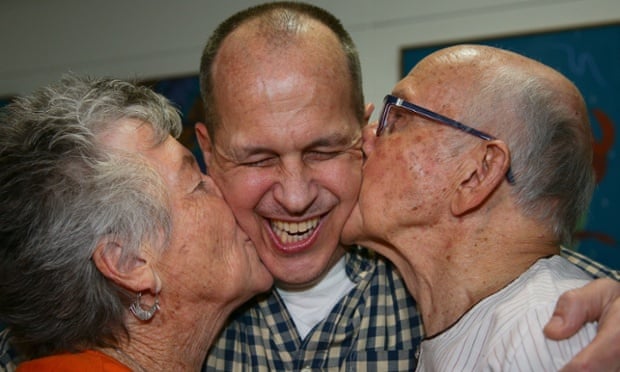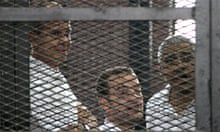Peter Greste returns to Australia with pledge to fight on for fellow captives
Speaking to Patrick Kingsley on board flight EK432, freed al-Jazeera journalist says ‘primary job’ is pushing for colleagues’ release from Egyptian prison
THE GUARDIAN,
FEBRUARY 4.

Greste’s two colleagues at al-Jazeera English, Baher Mohamed and Mohamed Fahmy, remain locked up. Though Famy looks set to give up his Egyptian citizenship so he can return to Canada. So too do three young students and a businessman, all four of them jailed in the same show-trial, despite never having previously met the three broadcasters. Outside Egypt, seven more journalists were convicted in absentia, and none of them yet have their names cleared.
“It’s great to be out,” said Greste. “But I’m really worried and really concerned that amidst all of the euphoria, people will lose sight of the fact that there are many others who were caught up with this. And the core message that I really want to send out is that if it’s not right to keep me in prison, then it’s equally not right for any of the others to be caught up in this case. Everyone involved in the case must be exonerated. The whole case must be thrown out.”

Occasionally on his flight home, Greste allowed himself a few moments of celebration. In his first tweets in over a year, he posted jubilant photographs of himself on a Cyprus shore, the sea rushing over his feet. It was a sensation he missed in jail, where even shower water is scarce.
The first drops of fizz were poured – in moderation – in Dubai. “Champagne, sir?” one of the purser’s colleagues asked Greste shortly before leaving UAE, holding out a little plastic glass of bubbly. “Yes,” smiled Greste. “I think it’s time.”
Much of the journey had been a slight anti-climax. He was released suddenly and secretly on Sunday, with little chance to say goodbye to his fellow inmates. On leaving prison, there were no waiting photographers or wellwishers. On arriving in Cyprus, Mike was the only person present to celebrate leaving the clutches of Egypt’s national airline.
Arriving in Brisbane, there was also little initial fanfare as he stepped off the plane. Two policemen were waiting for him. “Welcome home,” one said quietly. “Thank you very much,” said Greste, grinning from ear, in his first words on Australian soil. From there he and Mike were taken to a private room, gifted to them by the airport authorities, where their entire family greeted them with a cheer.
But the punch-the-air moment did not come until an hour after landing. Around a hundred supporters and journalists had stayed up to greet him at arrivals, some of them with placards and banners. “Journalism is not a crime,” read one, quoting one of the slogans from the campaign to free him. “Welcome home Peter Greste.”
And welcomed, he was. Just as the crowd’s concentration had started to drop, suddenly the doors slid open to reveal the man himself, surrounded by his family, arms aloft. People cheered, some cried, photographers shouted “This way, Peter! This way!”. A few wellwishers shouted for his autograph.
“I thought you were waiting for someone important,” Greste joked, before giving the gathered media the short statement they had come hoping for. In his courtroom cage in Cairo, during the recesses of his trial, Greste had struggled to make his voice carry to the reporters assembled behind a line of policemen on the other side of the room. But in Brisbane, his words were loud and clear.
“I can’t tell you how ecstatic I am to be here,” he smiled. “This is the moment I had rehearsed in my mind 400 times over the past, well, 400 days. And it feels absolutely awesome to be here.”
But once again, he sounded a note of caution. “This is all tempered by a real worry for my colleagues, for Mohamed Fahmy, for Baher, for all of the other guys … Egypt now has the opportunity to show that justice doesn’t depend on nationality.
“If it’s right for me to be free, then it’s right for all of those who were imprisoned in our case to be free, and it’s right for all those convicted [in absentia] to be freed from those convictions.”
But with that, the euphoria returned. Greste turned to his mother and father, Juris and Lois, who uprooted their lives to spend much of last year in Egypt, and wrapped an arm round them both. “It’s a darn sight better,” laughed Juris, “than visiting him in jail”.
No hay comentarios:
Publicar un comentario